MigratingHomeward
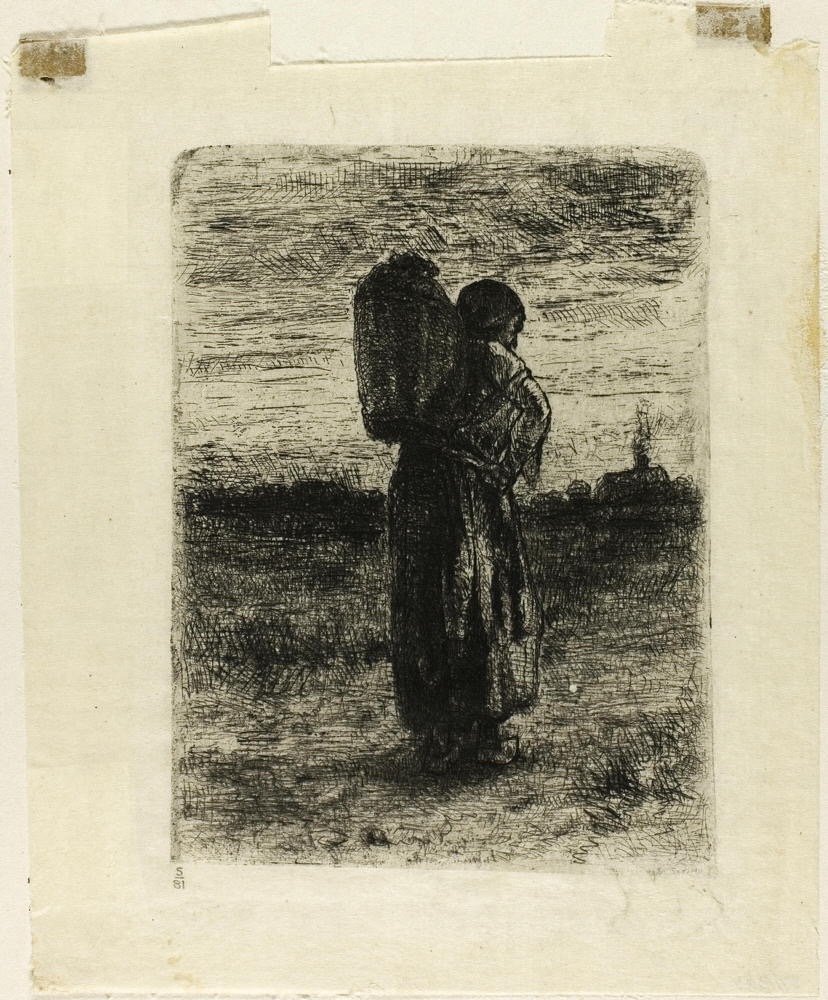
Jozef Israëls: Homewards (not dated)
"I am the product of apparently inexorable attraction, destinies manifest."
After 1800, the Swift family's arc shifted westerly. Its second century in the Americas would watch it move into, then through the so-called heartland. If family history was a race, the Swift progeny were to win it, for they would be among the first to see The Eden At The End Of The Oregon Trail. They would have to leave the Eden at the other end of that trail, though, and Grayson County, Virginia, clearly also qualifies as an Eden. Even the area of North Carolina where the Thomas Swift family first settled after traveling down The Great Highway from Maryland still seems Eden-like, it having been the setting of the old Andy Griffith Show's Mayberry, a museum in Andy's honor is located near the old Alamance Battlefield. The forces driving western migration were growing, though. Of course, my interest focused on those who left rather than those who stayed. Those who left became my forebears, while those who stayed behind will forever remain ever more distant aunts and uncles, cousins and hangers-on.
The records turn fuzzier after Flower Swift left Grayson County with his discredited son Thomas, probably first for Kentucky.
OddEnds
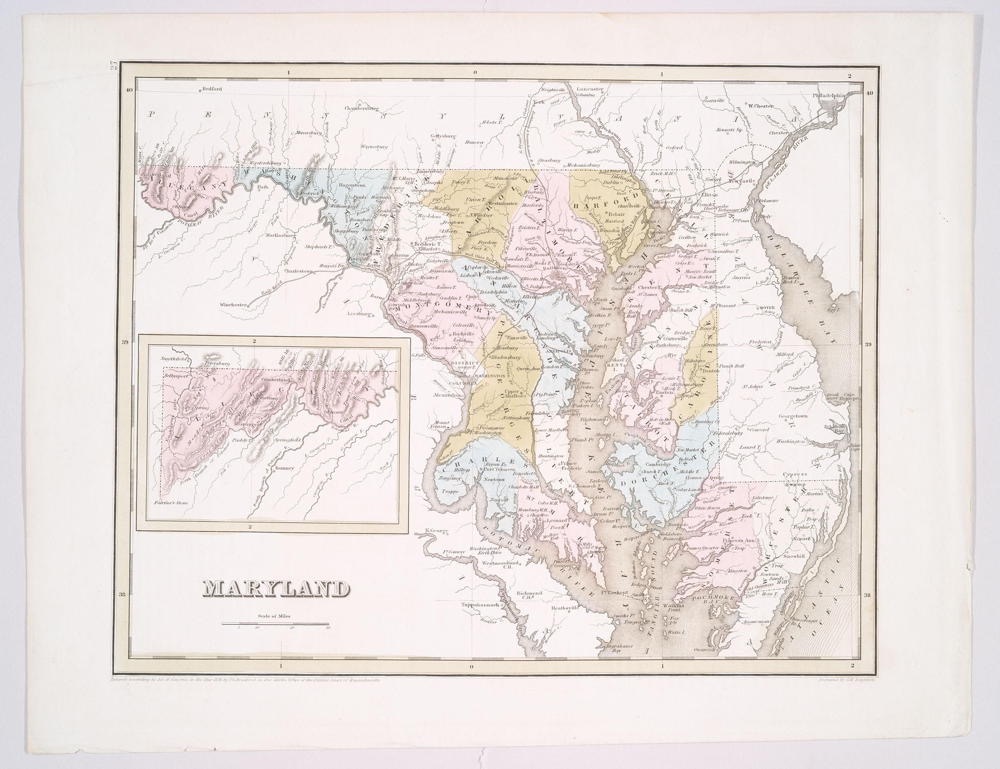
George W. Boynton, Engraver
T. G. Bradford, Publisher: Maryland (1838)
"The story could have been irretrievably lost in any generation."
Over half of the people coming to the British North American Colonies before the Revolution came as indentures. In 1674, one of my ninth great-grandfathers appeared in court in Maryland. A ship's captain, Thomas Jones, brought my forebear, his servant Edward "Teage," before the court, asking the judge to assess his age. The judge decided he was fourteen. The following year, Jones returned to court to claim a "headright" of land granted to him for transporting Edward Teage and three others to Maryland. A headright claim could grant land to anyone transporting people to the Maryland colony. Typically, those transported then worked as servants to the transporter for some period of years; after, if they survived, they would be free to do whatever they pleased. Fewer than half survived their indenture. Teage survived.
In 1695, Teague was back in court, claiming the right to 300 acres of land.
Prominence
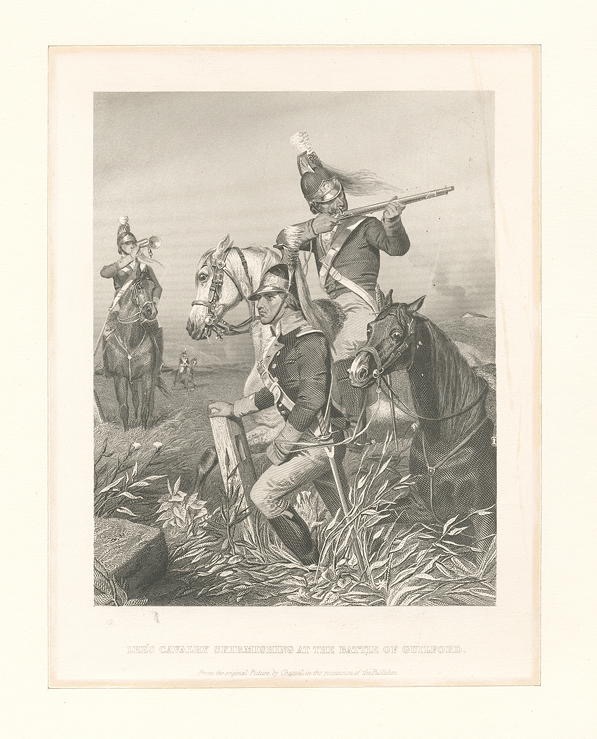
Unknown Artist: Lee's cavalry skirmishing at the Battle of Guilford.
(Print Issued 1789 - 1880)
"He left his Prominence behind."
Perhaps due to his Militia service in the Revolutionary War, my fifth great-grandfather, Flower Swift, rose to Prominence. With this came close brushes with several famous personalities. He served with distinction, though few details have been passed down. Those that survived show him to have been plucky, taking full advantage of his good fortunes. After Charleston's fall but before Camden, he was captured by a Tory patrol. As was the custom, he was disarmed and immediately paroled. Still, before he was dismissed, he overheard two British officers speaking of a planned assault on a crucial Rebel lead mine in his district. He reported this information to his officers, who passed it up the chain, clear to the offices of Virginia's Governor, Thomas Jefferson, who mustered additional militia units, appointing William Campbell, Patrick Henry's brother-in-law, to lead the expedition, and Walter Crockett, Davy's great uncle, as second in command. Swift's company most certainly fought under these in the following Battle of Guilford Courthouse, a pyrrhic victory for British forces that helped weaken the British before Yorktown. He certainly also fought at King's Mountain and in some expeditions against the Cherokee in Tennessee.
Swift served as a quartermaster when not riding or fighting.
Weekly Writing Summary For The Week Ending 3/28/2024
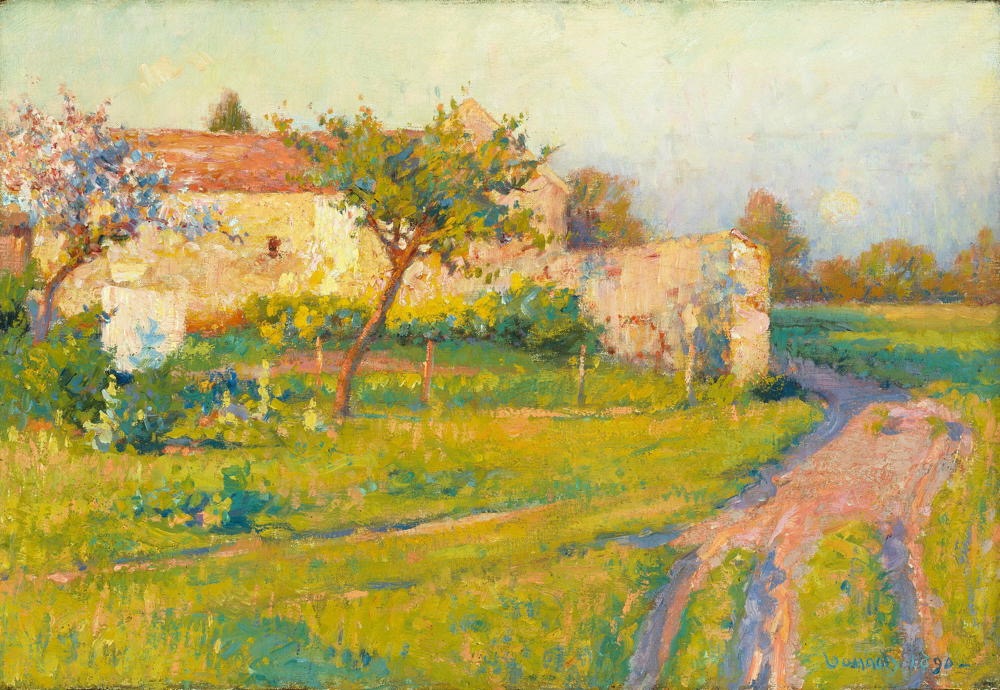
Robert William Vonnoh: Spring in France (1890)
Stories That Might Never Manage To Be Completely Told
Writing history seems very similar to writing fantasy. The writer must focus on coherence and continuity in both genres, for every story demands these. Nobody ever foresees what any story will demand of them. Research always proves wanting. I've been pouring through papers I have been collecting for decades, stumbling upon fresh details, and choosing which might fit into these stories, for no history scales to one inch equals one-inch granularity, and their continuity ultimately relies upon omissions. Complete histories must prove to be utter confusion; ditto with complete fantasies. Infinite effort might eventually prove the most satisfying. John Cage insisted that silence serves as the soul of all music. Mattisse allocated white spaces on his later canvasses. My progeny might easily use my history as a departure point to create some related, perhaps even more pleasing installments, for history seems alive and ever-growing. The actors eventually depart, but they leave behind their more resilient parts, stories that might never manage to be completely told.
Militia
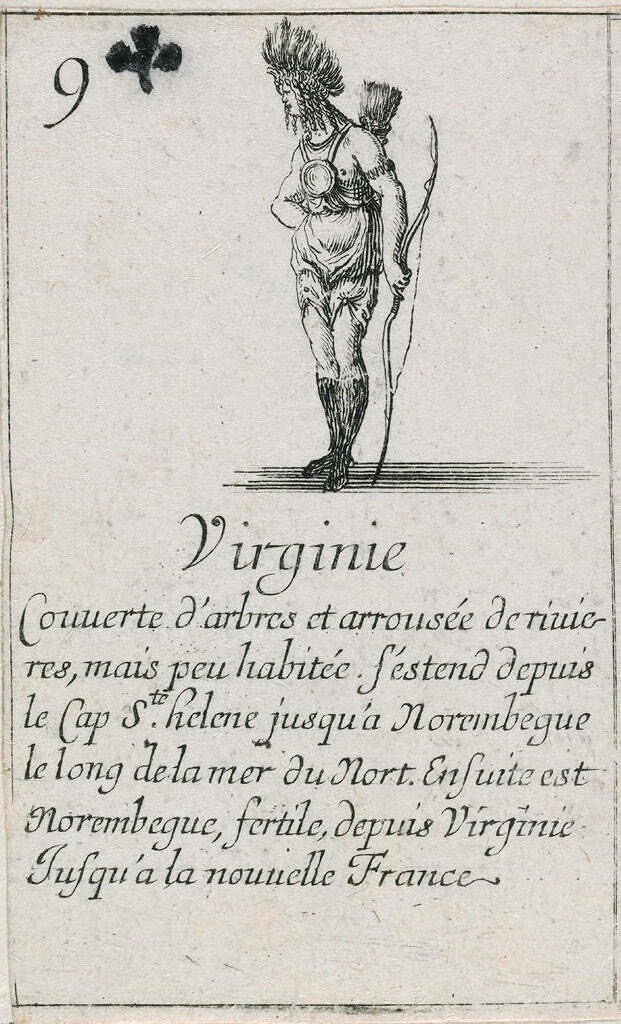
Stefano Della Bella: Virginia (17th century)
"Eye for an eye justice ruled the rough Western edge of our emerging nation."
Some accounts describe Flower Swift as a Quaker, while others report he was likely Baptist. Such distinctions made little difference along Virginia's Western Frontier in the last quarter of the eighteenth century. Swift's wife, Mary Bedsaul, was most certainly a Quaker, having come from an acknowledged Quaker family, and it's recognized that the militia company Swift led, first as a Captain and then later as a Colonel, was labeled a "Quaker" company. He might have been deemed qualified to serve to lead Quakers because he had Quakers in his extended family. Quakers might seem unlikely members of any military force, for even in colonial times, they refused to take the otherwise required oath of allegiance to the Commonwealth:
"We whose names are hereunder subscribed do swear that we renounce all allegiance to George Third, King of Great Britain, his heirs’ successors,
Flower
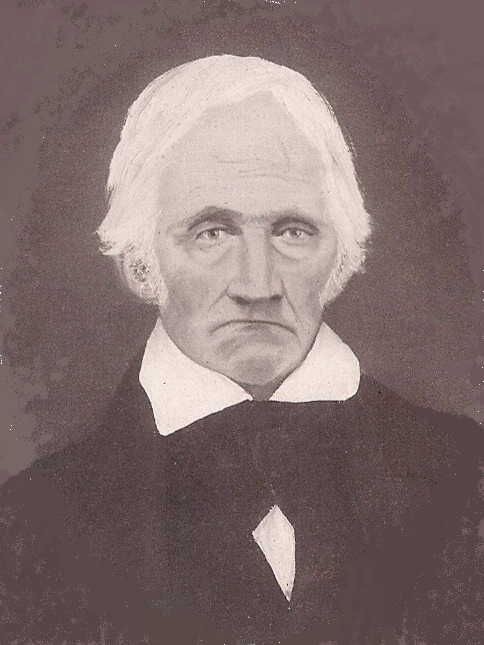
Flower Swift, a fifth Great-grandfather
(artist unknown) circa 1810
"The Revolutionary War was brewing … "
In the decades following the Lewis and Clark expedition, geographers and surveyors scoured the inner-mountain West, attempting to create accurate maps of the newly discovered territory. They were able to produce credible maps, too, which were certainly helpful enough to guide the upcoming pilgrims who would soon be flooding the Plains. Genealogy seems a similar occupation, for I'm scouring unfamiliar territory, seeking the source of incoming flows. If I find evidence of an ancestor, I wonder where they originated. I spot the higher peaks, knowing that more water will likely come off them. The high peaks in genealogical research tend to be the more famous people, for their notoriety encourages more researchers to focus and, therefore, discover more incoming flows.
The highest mountain in my family's history contains the unlikely name of Flower.
Jackson

Sidney E. Morse: Iowa (1842 - 1845)
Lionel Pincus and Princess Firyal Map Division
New York Public Library
" … only a little more than one-sixty-fourth of my DNA."
When she died in 1826, my fourth great-grandmother, Rachel Parker Jackson, left behind a four-year-old son with a high falutin' name, Nathaniel Parker Jackson. His paternal grandparents would raise him and his two surviving siblings to maturity near the Ohio River in Miller Township, Indiana. Shortly after his twenty-first birthday in 1843, he would head West toward Iowa territory in an oxcart with his new bride, Elizabeth Jane Teas. There were rumors that his grandparents had been stern replacements for his deceased parents and that he was anxious to get out on his own. I've always wondered why he set out so late in the year, for starting a westward journey in the Spring was more common. They left late in the year and made it only as far as the Burlington, Iowa, Mississippi River ferry crossing before disaster struck. Elizabeth slipped on the ferry and fell into the freezing river. She contracted pneumonia and died on her honeymoon, buried in Burlington, Iowa.
Ferries then were not yet steam-powered.
PilGrimEconomics
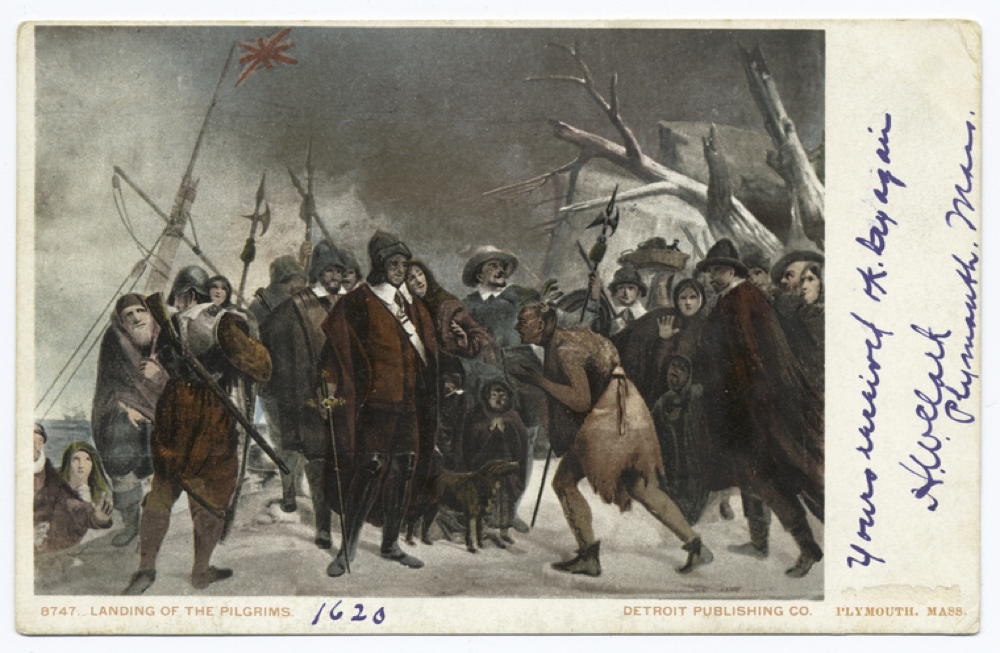
Postcard: Landing of the Pilgrims, Plymouth, Mass. (1898 - 1931)
"Their future insisted upon first routing them through their distant past."
Today, our Pilgrim ancestors are most often characterized as religious people who fled Old World oppression to found a new world rooted in religious liberty. Most pilgrims didn't believe in religious freedom. Besides Roger Williams, who founded a break-away colony in Rhode Island, Pilgrims were the soul of intolerance. Their intolerance was not solely rooted in spiritual conviction but perhaps primarily in economics. They'd mortgaged themselves as well as their ideals to fund their colonies. Not even in the early seventeenth century did money grow on trees. A wealthy congregation member didn't fund their expedition; stock investors did. They fronted our ancestors with the explicit expectation that they would be repaid and expected to be repaid handsomely and quickly, for they imagined they'd outsmarted the market to get in on the bottom floor of unlimited profits. Wasn't that New World brimming with resources ripe for plundering?
As always, the wild-eyed investors wildly underestimated the challenge, as did their Pilgrim debtors.
Perils
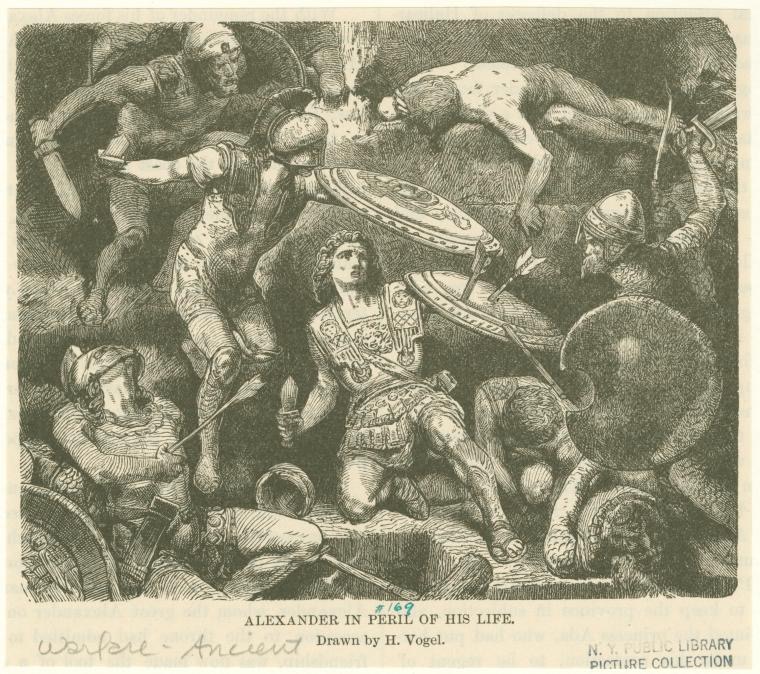
Hermann Vogel: Alexander in peril of his life 1885
" … what it must have meant … "
Writing history seems much more risky than writing my usual Philosophical, Autobiographical, Historical Fiction in the same way fantasy seems less exacting than fact. In fantasy, space wars rely upon thrusters and explosions spouting blossoms of flame that, in reality, simply could never happen. Real space battles would seem dull in comparison. Lest history seem tedious, the seduction to embellish hovers nearby. Who wouldn't want to characterize their forebears as noble? The inherent ambiguity present in any history leaves plenty of room for interpretation. Should I explain that the displaced local natives referred to my great great great grand pops as "a good white man," or am I indulging myself in whitewashing if I mention this, however much truth it might hold? I find myself surrounded by such judgment calls, each a dilemma with no entirely defensible resolution.
I choose. I feel forced to choose blindly.
Parker
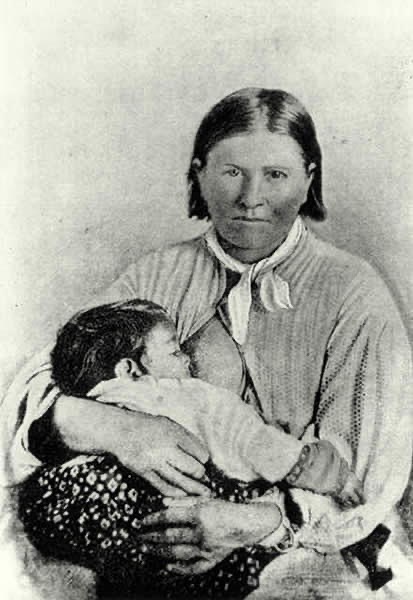
Cynthia Ann Parker, or Narua (Was Found),
and daughter, Topsannah (Prairie Flower), in 1861
" … I carry some of their life lessons within me …"
Cynthia Ann Parker, the niece of my fourth great-grandmother, Rachel Parker, might have been the most famous person in the history of our Fambly. She was the granddaughter of famed frontiersman and Revolutionary War soldier John Parker, Rachel's father, who was also a Predestination preacher of a Calvinist sect so conservative that it would have probably refused to grant Calvin admission into their congregation. Parker's vitae reads like a library full of dime-store frontier novels. He helped clear the frontier with Daniel Boone (stay tuned; there's a direct relationship with one of Boone's children in a later chapter), subdued the Cherokee, and generally made life miserable for natives and, later, Mexicans. Steven Austin invited him to migrate into Texas territory in the immediate aftermath of the Alamo debacle, where he founded a fort named after him, which is now Fork Parker State Park near the Texas town of Groesbeck. He was my fifth great-grandfather.
Shortly after he arrived in Texas, his rough blockhouse fort was overrun by Comanche, who killed him and four of his sons, along with other settlers.
Weekly Writing Summary For The Week Ending 3/21/2024
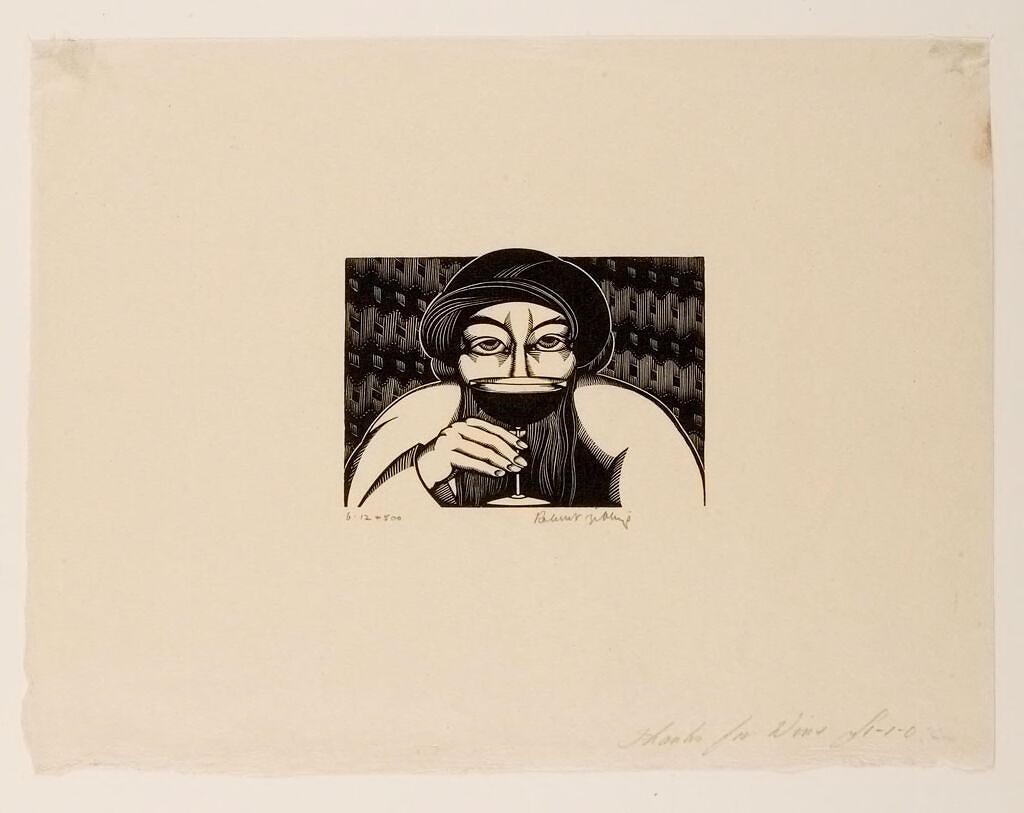
Robert John Gibbings: Thanks for Wine (20th century)
The Freedom To Not Quite Notice
I write without an outline, reorienting myself each morning depending on what I created the day before and how I feel in that moment. My intention involves letting the plot-line emerge rather than concocting it beforehand, though this practice guarantees a few inconsistencies. I cannot return to make up a missed day, for my practice depends upon accepting whatever happens. If my laptop crashes and refuses to produce, I have no net to catch me. My iAlogue Series weighed in at only eighty-five stories rather than the usual ninety due to technology failures and some winter ennui, perfectly normal disruptions. My writing practice depends upon an uncertain amount of innocence on my part, a dedicated absence of artifice. I sometimes embarrass myself, but fortunately for me, I rarely notice. One of the joys of naive practice must be the freedom to not quite notice or care when I crash.
DeepBackground

Robert John Gibbings: Ancient History (20th century)
"I understand who's driving."
Asking where a family comes from presupposes that a family might have originated in some specific place. Mine didn't. Yours probably didn't either. While I sport an apparently German surname, even its origin proves more complicated than any one location might explain, for the part of Germany that part of my family left had been contested territory, sometimes France and other times Germany, for generations and even before that contention, complications existed between ethnicities and religions. I might claim to 'be' German, but my family could just as easily declare a hot half dozen other origins. We've been on the front lines of most of modern history, and who knows how far back we go; other than that, we know for sure that our family, like yours, didn't originally spontaneously appear out of nowhere. I might claim to have had a noteworthy ancestor alive in 500 AD, but anybody can make the same claim even without anybody noteworthy on their tree. Our origins disappear into antiquity, DeepBackGround.
Following my family's progression across just this continent proves equally frustrating, for we have at one time or another claimed to inhabit perhaps a third or more of the present states in this union.
Fambly
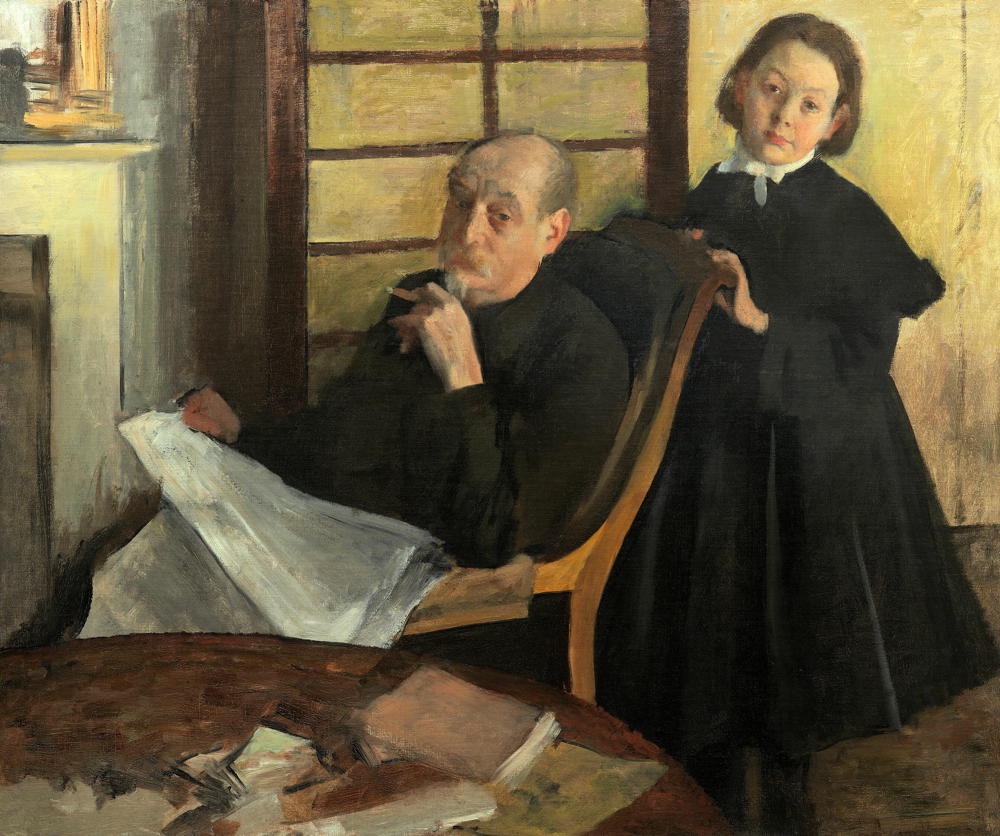
Edgar Degas:
Henri Degas and His Niece Lucie Degas
(The Artist’s Uncle and Cousin) (1875/76)
“ … Their marriage was long and contentious …”
Family's different. Whatever the usual rules entail, notable exceptions exist for family members. Greater patience might seem necessary, and such patience gets granted without making too much of a spectacle. Family served as the primary medium for your orientation in this world, much more than school, church, or other affiliations. It served as the teacher when nobody noticed anybody teaching anything and the student when nobody noticed anybody learning anything. Its lessons were subtle and sometimes profound. They helped set up patterns that would resonate in your behavior for generations. You probably passed some of them on to your children. You might notice a few appearing in your grandchildren, too. They represent the way your family works.
Families create their own language, which is slightly different from every other family's.


